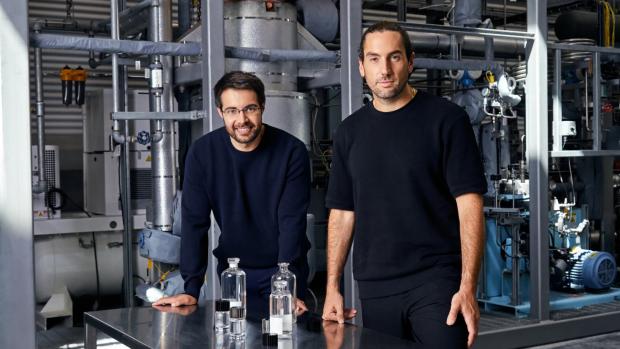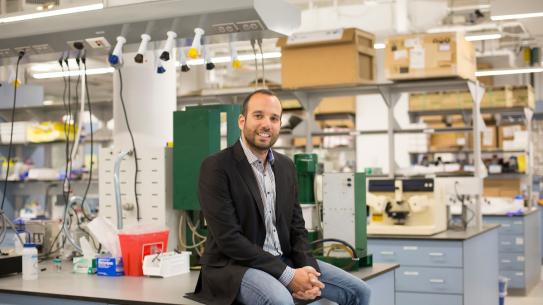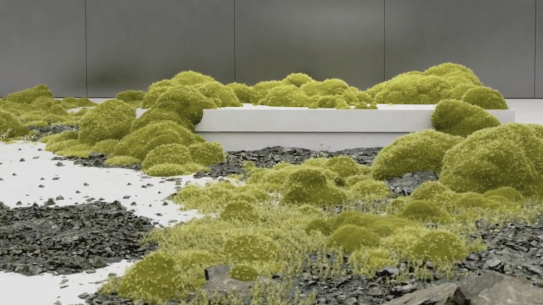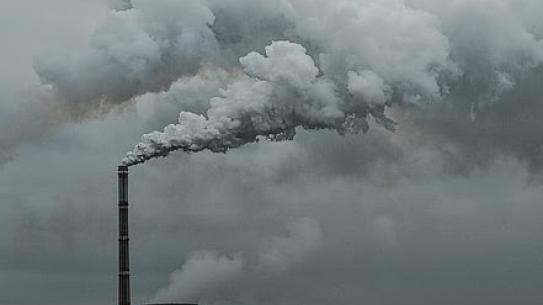Hard tech lab space can be hard to find
NYU Tandon is helping with a new kind of collaboration

The co-founders of AIR COMPANY, a current member of Tandon's Urban Future Lab (photo source: aircompany.com)
Trying to launch any tech start-up poses myriad challenges. But hard tech entrepreneurial endeavors, like those involving chemical processes, face even greater hurdles, since the wet benches and fume hoods needed for that type of work are expensive and not readily accessible to business founders unconnected to major academic or industrial facilities.
Miguel Modestino, the Donald F. Othmer Associate Professor of Chemical Engineering and the inaugural director of NYU Tandon’s Sustainable Engineering Initiative, would like to help rectify that. “We have extensive facilities here in our lab, and partnering with promising start-ups is a win-win situation; founders gain access to a highly specialized suite of equipment and input from experienced faculty members, and our students are well-positioned to take advantage of internship and hands-on learning opportunities.”
Modestino himself is no stranger to the entrepreneurial world: he is a co-founder of Sunthetics, an enterprise housed in its early days at NYU Tandon’s Urban Future Lab (UFL) and now devoted to accelerating the development of sustainable chemical processes via machine-learning optimization. He helped two students, Myriam Sbeiti (‘18) and Daniela Blanco (‘20) — who was Global Student Entrepreneur of the Year in 2019 and is now Sunthetics’ CEO — launch the company back in 2017 and has a first-hand understanding of how hard it can be to access the resources needed for success.
Now, AIR COMPANY — a current member of the UFL that uses CO2 to create sustainable alcohols and fuels that can be applied to a variety of consumer and industrial products — has laboratory space in Rogers Hall. The company recently developed a Sustainable Aviation Fuel (SAF) made from captured CO2 with support from JetBlue, Virgin Atlantic, Boom Supersonic, and the United States Air Force. In collaboration with Modestino, they’ve won a Small Business Technology Transfer (STTR) Program grant from NASA to make integral strides towards carbon-negative rocket fuel for space applications on Earth, Mars, and beyond. Together, they are studying the feasibility of using the technology to produce rocket propellant and to one day deploy on Mars to produce a stable, storable fuel in-situ, using only the Martian atmosphere, water, and solar photovoltaic electricity.
The AIR COMPANY team is working in Tandon’s chemical engineering labs to test various catalyst compositions so that Modestino and Ricardo Mathison, a doctoral student under his direction, can develop computational models of the company’s process in order to optimize production for the multistep system under both Martian and terrestrial conditions.
“Space applications have historically helped new technologies mature, to become more practical on Earth. This research takes learnings from others that successfully achieved massive scale; for example, solar photovoltaics,” says AIR COMPANY’s co-founder and CTO, Dr. Stafford Sheehan. “Together with NYU and Professor Modestino, one of the world’s top experts in sustainable chemical processes, we will deliver a practical fueling solution to NASA.”
Modestino views the AIR COMPANY/ Urban Future Lab collaboration model as an ideal example of how NYU Tandon can partner with promising start-ups in innovative ways to overcome major barriers to new cleantech solutions, particularly in hard tech, where it is notoriously difficult to achieve scale in new technologies due to the high cost and logistics associated with necessary materials and equipment.
He uses the Technology Readiness Levels (TRLs) scale to describe a crucial market gap in the new technology commercialization process. Developed by NASA in the 1970s to evaluate space program readiness, TRLs are based on a scale from 1 to 9, with 9 being the most mature technology. It has now been more widely deployed across sectors to describe new technology commercialization potential and scalability.
TRLs 1-3 is the stage where academia often focuses — on fundamental basic science research without immediate application. At TRLs 7-9, a technology is mature enough that a large company has a financial incentive to step in and scale its use. But in levels 3-6, a technology is far enough in development that pure academics won’t necessarily take an interest, but it’s still too early for larger companies with relevant resources to take a risk on investment.
It’s that middle point where Modestino sees the potential for academia-startup collaboration, like the one with AIR COMPANY, to help new climatetech reach scalability faster through shared lab space, equipment, materials, and brain power.
Forging such partnerships is just one tool in Modestino’s arsenal as director of Tandon’s Sustainable Engineering Initiative, which is addressing climate change and environmental contamination with a multipronged approach he calls AMRAd — an acronym that stands for avoiding pollution altogether; mitigating the effects of pollutants and preventing them from reaching the environment; remediating any damage caused by contamination; and adapting to a changing environment when necessary. More than 20 faculty members from various departments — including Chemical and Biomolecular Engineering, Civil Engineering, and Electrical Engineering — participate in the Initiative, which is the latest of Tandon’s long list of contributions within the realm of sustainability.
While the sustainable engineering initiative might be new, Tandon has been working in green technology and helping solve climate change for close to a decade through the UFL, which nurtured Sunthetics and now supports AIR COMPANY, along with several other member startups that have the common goal of leaving the planet a better place for future generations.
Since its launch in 2014, in partnership with the City and State of New York, and NYSERDA the UFL has incubated some 70 successful companies, raised well over $1 billion in capital, and created more than 1,000 jobs. “Our collaboration with Dr. Modestino’s lab strengthens our offerings to climatetech startups,” says Pat Sapinsley, Managing Director of the Urban Future Lab. “Until now our value to our startups has been through curated introductions to corporate partners, investors, and customers as well as scale up advice and mentoring. Now we can also offer lab space, a tremendous boost to early-stage companies.”
“We are happy to have AIR COMPANY, whose CTO and Co-Founder, Dr. Stafford Sheehan, is one of the most innovative chemists in the climate tech space, working here with us at the UFL and Tandon,” Modestino says. “We hope to have many other sustainable engineering companies joining us in the future, since we have truly unique facilities and a vibrant innovation ecosystem to offer them. Ultimately, our goal is to forge fruitful collaborations and help New York City become a global cleantech innovation hub.”

Modestino Research Group

AIR COMPANY





